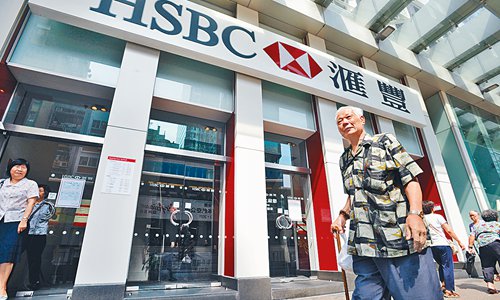COMMENTS / INSIDER'S EYE
Stand-in HSBC boss passes first interview hurdle but further obstacles ahead

People pass by a HSBC bank in Hong Kong in February. Photo: IC
In soccer, caretaker managers are typically "nice guys" appointed to gee up a failing team's morale before handing over to a more serious option. HSBC's Noel Quinn is taking a different approach, with plans to cut up to 10,000 jobs at the $150 billion lender just months after taking over as interim chief executive. Still, he's only passed the first stage of an ongoing job interview for the permanent role.
The cuts, reported on Sunday by the Financial Times, could be focused on Europe and would come on top of previously announced layoffs of more than 4,000 people. Such a decisive move, only two months after Quinn took over from John Flint, would help mark out the former commercial bank head from his predecessor who had a reputation for ducking major decisions.
It could also boost HSBC's pathetic returns in Europe; the region made an $815 million loss before tax last year. Its operating expenses accounted for more than half of the bank's total, but the region generated just one-third of group net operating income. Assume Quinn lays off the mooted 10,000 employees, and take the bank's $71,000 average compensation per employee in 2018. He could save $714 million per year. Using 2018 figures, and assuming the savings dropped through to the bottom line, it would have boosted the group's return on tangible equity to 9.1 percent from 8.6 percent.
That would nonetheless only mark a small victory. After the previously announced cuts and additional 10,000 layoffs, HSBC would have about 224,000 staff who will generate $15 billion of net income this year using Refinitv data. That works out at about $67,000 of earnings per employee.
Quinn's other strategic puzzle would in any case remain unsolved. HSBC's US operations generated a measly 2.5 percent return on tangible equity in the first half of 2019 - down from 2.7 percent in the whole of 2018. Its 6 percent 2020 target looks unlikely, but Quinn can't exit the US and still claim to run a truly global trade bank. Equally, attempts to earn a return from its $133 billion of risk-weighted assets there have repeatedly flopped. To definitely lose his "interim" moniker, he needs to come up with an innovative workaround.
The author is Liam Proud, a Reuters Breakingviews columnist. The article was first published on Reuters Breakingviews. bizopinion@globaltimes.com.cn
